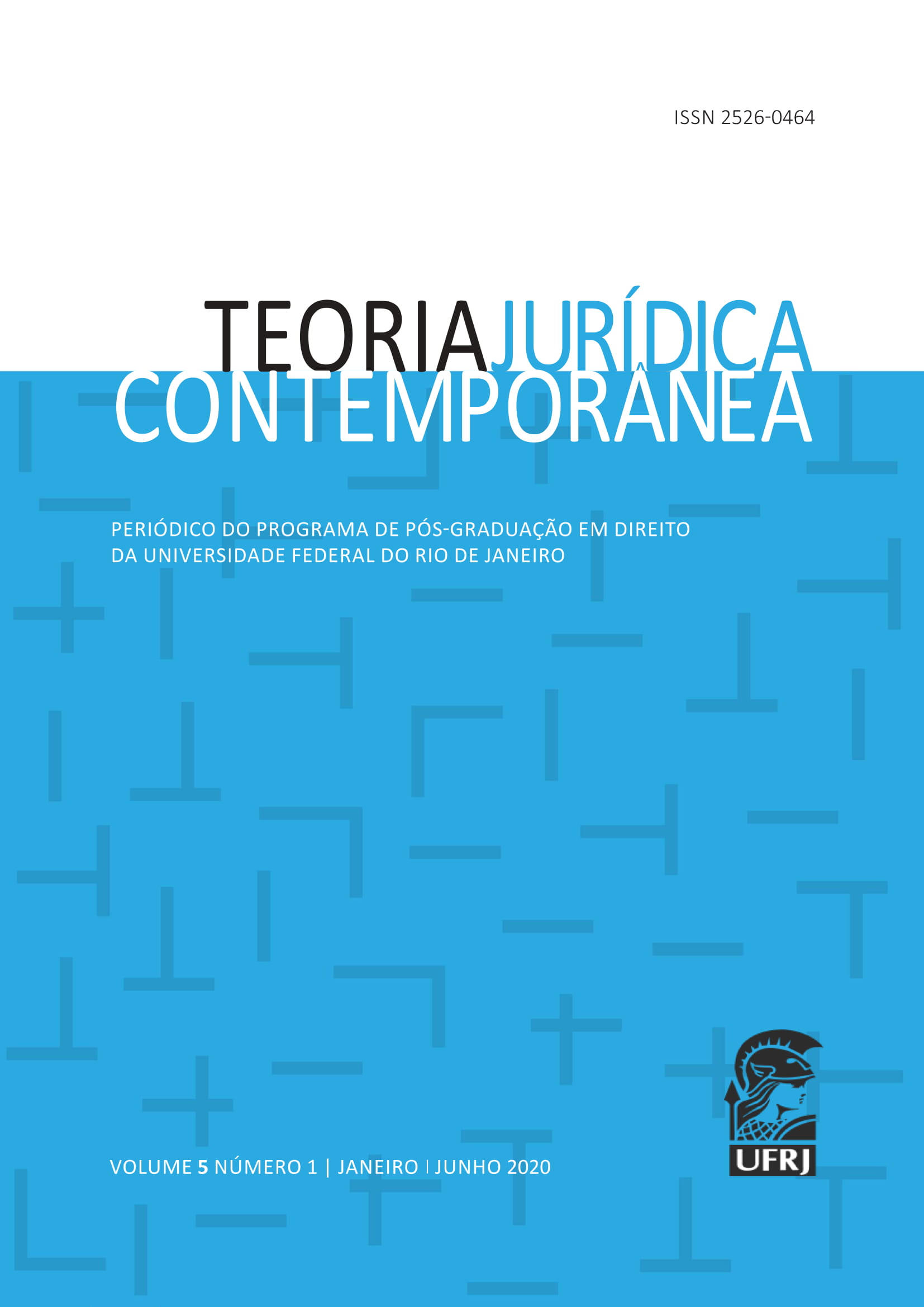The concept of person with disability and the proposal for a dialogue of courts: analysis of its meaning in the Inter-American Court of Human Rights and the Case-Law of Brazilian Upper Courts
DOI:
https://doi.org/10.21875/tjc.v5i1.27499Keywords:
Inter-American Court of Human Rights, Fundamental rights, Persons with Disabilities, Supreme Federal Court, Superior Justice TribunalAbstract
ABSTRACT:
The present research aims to analyze the concepts of persons with disabilities within the extent of the jurisprudence of the Inter-American Court of Human Rights and the jurisprudence of Superior Courts. From this inaugural study, the concepts will be compared, in order to first determine if there is a relationship between them and, if the answer is positive, whether this relation is in the sense of refutation / withdrawal or complementation. For this, the methodology of concrete constitutional hermeneutics will be used. During the analysis, institutes such as the medical model and the social model of disability verification will be revisited, as well as the theory of disabilities, correlating them with the new readings given to fundamental rights
Downloads
References
BARBOZA, Heloísa Helena; Almeida Junior, Vitor de Azevedo. Reconhecimento e inclusão das pessoas com deficiência. Revista Brasileira de Direito Civil – RBDCivil, Belo Horizonte, volume 13, p. 17-37, julho/setembro 2017.
BARBOZA, Heloísa Helena; ALMEIDA, Vitor. Comentários ao Estatuto da Pessoa com Deficiência à luz da Constituição da República. Coordenadores Heloísa Helena Barboza e Vitor Almeida. Belo Horizonte. Editora Fórum. 2018.
BARBOZA, Heloísa Helena. Artigo chamado de “Desafios para a efetividade da Lei Brasileira de Inclusão”. Dentro do livro Direito, Vulnerabilidade e Pessoa com Deficiência. Editora Processo. Rio de Janeiro. 2019. Organizadoras Raquel Bellini Salles, Aline Araújo Passos e Juliana Gomes Lage.
BRASIL, Constituição (1988). Constituição da República Federativa do Brasil: promulgada em 5 de outubro de 1988. Disponível em: http://www.planalto.gov.br/ccivil_03/Constituicao/Constituicao.htm. Acesso em: 24. jul. 2019.
BRASIL, Decreto nº 3.298, de 20 de dezembro de 1999. Regulamenta a Lei nº 7.853, de 24 de outubro de 1989, dispõe sobre a Política Nacional para Integração da Pessoa Portadora de Deficiência, consolida as normas de proteção, e dá outras providências. Disponível em: http://www.planalto.gov.br/ccivil_03/decreto/D3298.htm. Acesso: 06.mai. 2020.
BRASIL, Decreto nº 6.949, de 25 de agosto de 2009. Promulga a Convenção Internacional sobre os Direitos das Pessoas com Deficiência e seu Protocolo Facultativo, assinados em Nova York, em 30 de março de 2007. Disponível em: http://www.planalto.gov.br/ccivil_03/_ato2007-2010/2009/decreto/d6949.htm. Acesso em: 24. jul. 2019.
BRASIL, Lei Brasileira de Inclusão da Pessoa com Deficiência (Estatuto da Pessoa com Deficiência. Lei Nº 13.146, de 06 de julho de 2015. Disponível em: http://www.planalto.gov.br/ccivil_03/_ato20152018/2015/lei/l13146.htm. Acesso em: 24. jul. 2019.
COSTA RICA. Caso Gonzales Lluy e outros Vs. Equador (discriminação contra criança com HIV/direito a educação) p. 8-12. Boletim Jurisprudencial da Corte Interamericana de Direitos Humanos. Nº 04, Setembro/Dezembro de 2015. Disponível em: http://www.corteidh.or.cr/sitios/libros/todos/docs/boletin4por.pdf. Acesso em: 10. fev. 2020.
CIDH, Corte Interamericana de Direitos Humanos. Caso Furlán y Familiares vs. Argentina. Excepciones Preliminares, Fondos Reparaciones y costas. Sentença prolatada em 31 de agosto de 2012. Disponível em: http://www.corteidh.or.cr/cf/jurisprudencia2/ficha_tecnica.cfmnId_Ficha=210. Acesso em:
mai. 2020.
CIDH, Corte Interamericana de Direitos Humanos. Caso Artivia Murillo e outros (“Fecundação” in vitro) vs. Costa Rica. Cumprimento de Sentença datado de 26 de fevereiro de 2012. Disponível em: http://www.corteidh.or.cr/docs/casos/articulos/seriec_257_por.pdf. Acesso em: 06. mai. 2020.
GUARNIZO-PERALTA, Diana. Disability rights in the Inter-American System of Human Rights: An expansive and evolving protection. Netherlands Quarterly of Human Rights, vol. 36, ano 2018. Disponível em: journals.sagepub.com/home/nqh. Acesso em: 06.
mai. 2020.
MADRUGA, Sidney. Pessoas com Deficiência e Direitos Humanos: ótica da diferença e ações afirmativas. 2ª edição. São Paulo. Saraiva. 2016.
MPF, Ministério Público Federal. Corte Interamericana de Direitos Humanos: Caso Gonzales LLuy e outros vs. Equador. Sentença de 01 de setembro de 2015. Disponível em: http://www.mpf.mp.br/ atuacao-tematica/sci/dados-da-atuacao/corte-idh/copy_of_ GonzalesLluyvEquadorRevisaovf.pdf. Acesso em: 06. mai. 2020.
ORGANIZAÇÃO DAS NAÇÕES UNIDAS (ONU). Declaração dos Direitos das Pessoas Deficientes de 09 de dezembro de 1975. Disponível em: http://portal.mec.gov.br/seesp/arquivos/pdf/dec_def.pdf. Acesso em: 24. jul. 2019.
PALACIOS, Agustina. El modelo social de discapacidad: orígenes, caracterización y plasmación en la Convención Internacional sobre los Derechos de las Personas con Discapacidad. Cermi. Madrid: Cinca, 2008.
PAIVA, Caio; HEEMANN, Thimotie Aragon. Jurisprudência Internacional de Direitos Humanos. Editora CEI. 3ª edição. Belo Horizonte. 2020.
PIOVESAN, Flávia. Artigo chamado de “O Brasil e o Sistema Interamericano de Proteção dos Direitos Humanos”. Dentro do livro Temas de Direitos Humanos. Flávia Piovesan. 6ª edição. São Paulo. Saraiva. 2013a.
PIOVESAN, Flávia. Artigo chamado de “Direitos Humanos e o Diálogo Jurisdicional no contexto latino-americano”. Dentro do livro Temas de Direitos Humanos. Flávia Piovesan. 6ª edição. São Paulo. Saraiva. 2013b.
PIOVESAN, Flávia. Artigo chamado de “Ius constitutionale commune latino-americano em Direitos Humanos e o Sistema Interamericano: perspectivas e desafios.” Revista Direito e Práxis. Volume 8. Número 2. Rio de Janeiro. Abril / Junho de 2017.
Downloads
Published
Issue
Section
License
The authors who publish in this journal agree with the following terms:
1. The authors maintain the copyright and grant the journal the right of first publication, with the work simultaneously licensed under the Creative Commons Attribution License that allows the sharing of the work with recognition of authorship and initial publication in this journal.
2. Authors are allowed to assume additional contracts separately, for non-exclusive distribution of the version of the work published in this journal (e.g., publishing in an institutional repository or as a book chapter), with acknowledgment of authorship and initial publication in this journal.
3. Authors are allowed and encouraged to publish and distribute their work online (e.g., in institutional repositories or as a personal page) at any point before or during the editorial process, as this may generate productive changes, as well as increase the impact and citation of the published work (See The Effect of Open Access).

This work is licensed under a Creative Commons Attribution-ShareAlike 3.0 Brazil License.

